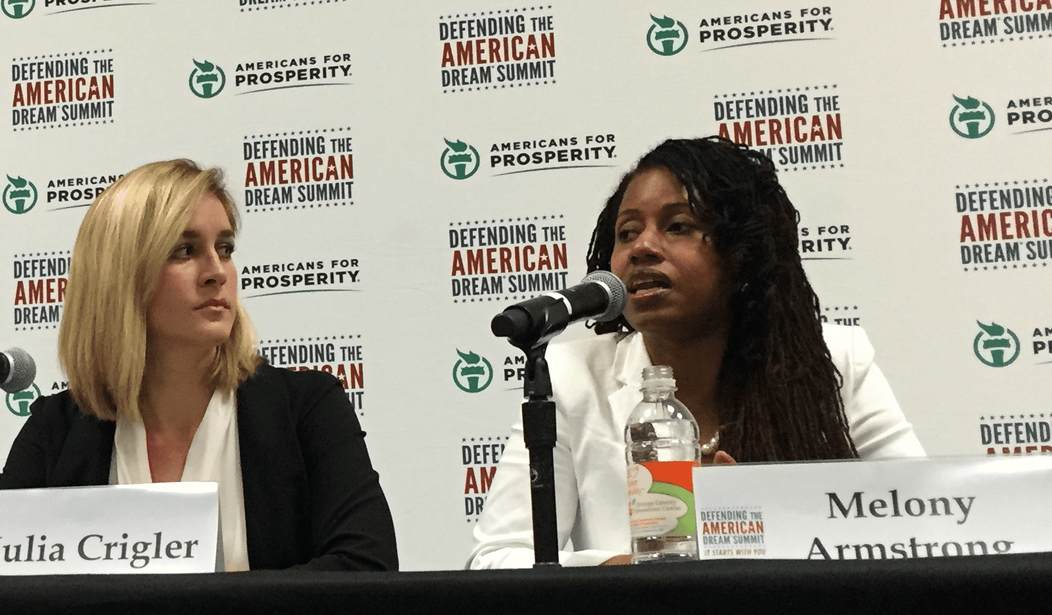ORLANDO, FL — A black female entrepreneur shared her story about the challenges of occupational licensing and advocated for less restrictive employment legislation at a conservative conference. In trying to set up a professional hair braiding business, she ran into a long list of unbelievable regulatory barriers.
“Once I learned how to braid, my dream of becoming a professional hair braider really started to turn into a nightmare, because I needed to find out what to do legally to open my business, and this is where I began to run into barriers,” declared Melony Armstrong, who now owns a successful hair braiding business in Tupelo, Mississippi. She spoke at the Defending the American Dream Summit hosted by Americans for Prosperity (AFP).
At each step in the process, Armstrong ran into more and more barriers to entry. “In order to open a braiding salon, I was going to need to have a 1500-hour cosmetology license,” she recalled. “Now, I really found this to be interesting, because cosmetology has nothing to do with hair braiding, and I explained this to them over and over again.”
Melony Armstrong: Due to occupational licensing, "my dream turned into a nightmare." #DreamTeam @IJ @AFPhq #tcot pic.twitter.com/NdApVJYq0I
— Tyler O'Neil (@Tyler2ONeil) September 3, 2016
This was just the beginning, however. When this budding entrepreneur realized she needed to hire other people for her business, she asked what she would have to do legally. The regulators told her she needed to perform 3200 hours of classwork, and then work 2 years under a cosmetologist — none of this had anything to do with braiding!
When Armstrong declared that it was then she “decided to fight back,” the crowd erupted in applause. “It was either give up my dreams, give up my life, give up my time, or fight back.”
Lee McGrath, the managing attorney for the libertarian legal firm Institute for Justice (IJ), declared that occupational licensing is “the biggest issue in labor economics today,” noting that one quarter of all workers across the nation have to acquire an official government license in order to have a job. “The government is segmenting the market, determining who can work and who cannot work.”
This regulation not only makes it harder for people like Armstrong to start businesses and create jobs — it also prevents millions from being able to find a job. McGrath estimated that “there are nearly 3 million people nationwide who would be working without occupational licensing.”
Because of the wide-ranging negative effects of occupational licensing, McGrath called it “Right to Work 2.0.” This fight for freedom from the government in employment is very similar to the fight for a worker’s ability to opt out of a union. Both are struggles against an entrenched status quo that damages economic opportunity. The IJ attorney personalized the big economic effects, declaring, “You and your neighbors have fewer opportunities due to occupational licensing.”
Julia Crigler, Kentucky state director at AFP, told the story of women in Louisville who came from the African country of Senegal. “These beautiful West Senegalese women” wanted to work, they wanted to braid hair for a living, but they ran into the same challenges as Armstrong did.
Crigler told the story of one woman whom the government shut down and fined $5,000. The licensing regulations which prevented them from working weren’t for public health or safety, they were created to keep people out of the business. So the Institute for Justice fought to repeal those laws, brought the women in their traditional dress to the state capital, and got it signed into law.
Next Page: A bipartisan issue? Republicans and Democrats both supported this bill, unanimously.
In fact, their bill had no opposition. “It came out of the state Senate unanimously, not a single vote against it,” Crigler recalled. “No one even spoke against the bill.” One official — whose wife benefitted from the status quo — introduced an amendment that not only would have undone the bill’s purpose, but would have worsened the employment regulations. The backlash was so strong, he withdrew the amendment without a single vote.
Occupational licensing is a serious problem, but when Democrats and Republicans realize what it means to individual workers, they cannot support it — at the very least in the egregious case of hair braiders in Kentucky and Mississippi.
As McGrath noted, however, licensing extends to huge areas of the economy. He listed three occupations licensed in the state of Florida: interior decorating, yacht salesmen, and ballroom instructors. In the days of Yelp and online reviews everywhere, “reputation is the best consumer protection,” the IJ attorney declared.
Armstrong agreed. “It’s the consumer who needs to be making these decisions, not the government,” the entrepreneur declared.
But there’s yet another benefit to cutting down on occupational licensing: It helps to elevate the poor. “People are not liabilities to be managed, they are assets to be developed through the dignity of earned success,” declared AFP’s director of policy, Akash Chougule. Cutting down on excessive employment regulation will not only alleviate the welfare burden on taxpayers, it will also restore fundamental dignity to people currently on the dole.
When Armstrong recounted her success in the fight to reform occupational licensing, she remembered that the very day legislation was passed to free hair braiders in Mississippi, 300 people registered to enter the profession!
When she was finally able to hire employees, many of them “came from a background of being dependent on the government.” She said her employees “are proud to leave a legacy to their children.”
Occupational licensing reform is already “destroying poverty in our communities, one braider at a time.”








Join the conversation as a VIP Member